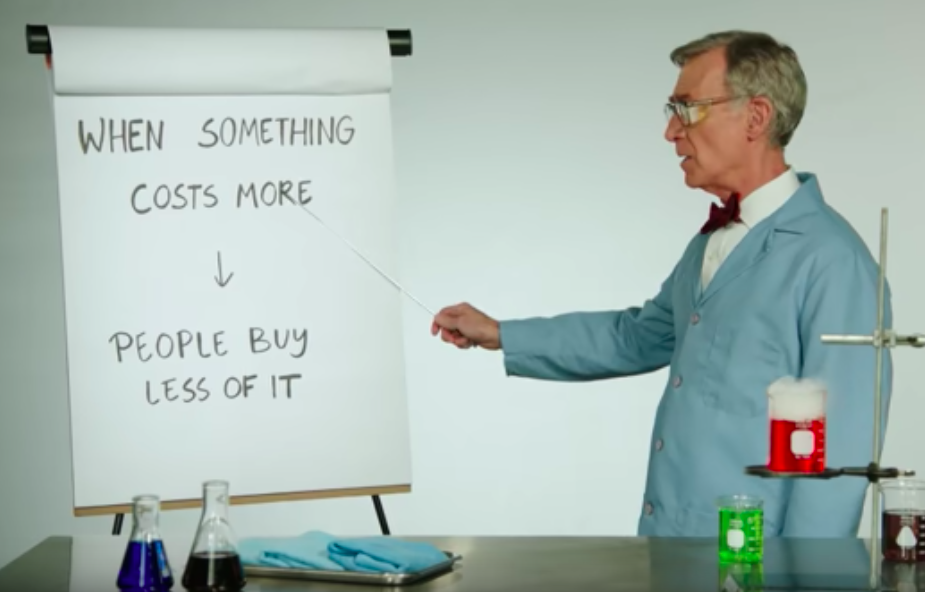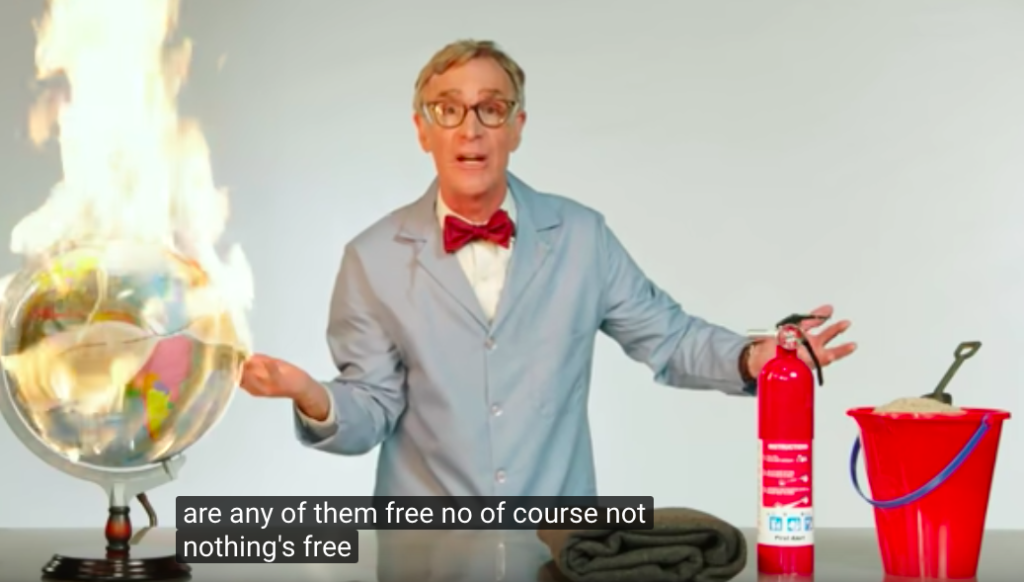One thing economists agree about: pricing carbon is essential to saving the planet; but if you don’t believe economists, you ought to believe Bill Nye, the Science Guy.
Economists are famous for disagreeing with one another. For every proposition, there is an equal and opposite economist. An even economists frequently have trouble selecting a single conclusion. Harry Truman famously lamented that he wanted a one-armed economist, so that he would never find his advice qualified with “on the other hand.”
Economists of all political stripes support carbon taxes
It’s striking, therefore that the leading lights of the profession, conservative and liberal, freshwater and saltwater, republican and democrat, are all in broad agreement on what it will take to tackle our growing climate crisis. Their collective statement on climate change was published by The Wall Street Journal. It’s clear, direct and to the point. We reprint it in its entirety here.
Global climate change is a serious problem calling for immediate national action. Guided by sound economic principles, we are united in the following policy recommendations.
I. A carbon tax offers the most cost-effective lever to reduce carbon emissions at the scale and speed that is necessary. By correcting a well-known market failure, a carbon tax will send a powerful price signal that harnesses the invisible hand of the marketplace to steer economic actors towards a low-carbon future.
II. A carbon tax should increase every year until emissions reductions goals are met and be revenue neutral to avoid debates over the size of government. A consistently rising carbon price will encourage technological innovation and large-scale infrastructure development. It will also accelerate the diffusion of carbon-efficient goods and services.
III. A sufficiently robust and gradually rising carbon tax will replace the need for various carbon regulations that are less efficient. Substituting a price signal for cumbersome regulations will promote economic growth and provide the regulatory certainty companies need for long- term investment in clean-energy alternatives.IV. To prevent carbon leakage and to protect U.S. competitiveness, a border carbon adjustment system should be established. This system would enhance the competitiveness of American firms that are more energy-efficient than their global competitors. It would also create an incentive for other nations to adopt similar carbon pricing.
V. To maximize the fairness and political viability of a rising carbon tax, all the revenue should be returned directly to U.S. citizens through equal lump-sum rebates. The majority of American families, including the most vulnerable, will benefit financially by receiving more in “carbon dividends” than they pay in increased energy prices.
The letter is signed by these distinguished economists, including among their members Nobel Prize winners, Chairs of the Federal Reserve Bank, Treasury Secretaries, and Chairs of the President’s Council of Economic Advisers.
George Akerlof, Robert Aumann, Angus Deaton, Peter Diamond, Robert Engle, Eugene Fama, Lars Peter Hansen, Oliver Hart, Bengt Holmström, Daniel Kahneman, Finn Kydland, Robert Lucas, Eric Maskin, Daniel McFadden, Robert Merton, Roger Myerson, Edmund Phelps, Alvin Roth, Thomas Sargent, Myron Scholes, Amartya Sen, William Sharpe, Robert Shiller, Christopher Sims, Robert Solow, Michael Spence and Richard Thaler are recipients of the Nobel Memorial Prize in Economic Sciences.
Paul Volcker is a former Federal Reserve chairman.
Martin Baily, Michael Boskin, Martin Feldstein, Jason Furman, Austan Goolsbee, Glenn Hubbard, Alan Krueger, Edward Lazear, N. Gregory Mankiw, Christina Romer, Harvey Rosen and Laura Tyson are former chairmen of the president’s Council of Economic Advisers.
Ben Bernanke, Alan Greenspan and Janet Yellen have chaired both the Fed and the Council of Economic Advisers.
George Shultz and Lawrence Summers are former Treasury secretaries.
Preparation of the letter was organized by the Climate Leadership Council. More information is available at www.clcouncil.org.
And so does Bill Nye, the Science Guy.
One trope of the classic 1950s disaster movie was the coterie of scientists announcing to the world the nature of the new threat (Godzilla, aliens, etc). In those movies, the world’s leaders believe what the scientists are telling them and act accordingly and even if the first solutions don’t work, they persist. Well, at least that’s how things work in the movie. In reality, we seem to be very good at ignoring or denying credible warnings from smart people.
OK: Appeals to authority may not work. Maybe we need simple dramatics for those of us who can only digest information in the simplest terms. In that case, let’s turn the microphone over to Bill Nye, the Science Guy, with a media assist from Last Week Tonight’s John Oliver.
Nye explained how a carbon tax is essential to reducing greenhouse gas emissions and solving climate change:
 The simple economics of carbon taxation.
The simple economics of carbon taxation.
Many believe that the problem of climate change is subject to a technical fix. Like engineer Montgomery Scott in an episode of Star Trek, some last minute tweak to the ships engines (reversing the polarity of the di-lithium crystals) will avert catastrophe in the nick of time (i.e. about minute 48 of this week’s show).
Our desire for solutions that are free and easy and that someone else (i.e. Montgomery Scott) does all the work on seem preferable, but they’re hardly realistic. In the face of a global catastrophe, we’ve got to expect to change our behavior. And frankly, Bill seems to be losing his patience with us.
Even if you believe technology is a critical part of the problem–perhaps especially if you believe technology can solve the problem–its important to recognize that pricing carbon is essential to providing the incentives and financial capital needed to develop that technology. As long as fossil fuels are cheap, businesses and investors have no incentive to to develop or buy such technologies; inventors will find it hard to raise capital for such technologies, and consumers will have little reason to buy them. Pricing carbon sends the right signals to everyone, both to stop using the dirtiest technologies, and to refine and improve the cleanest ones. Take it from economists, or from science guys.
